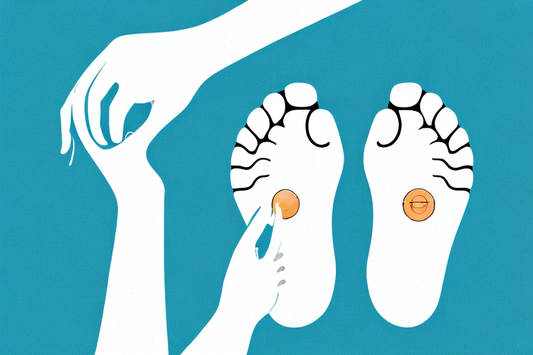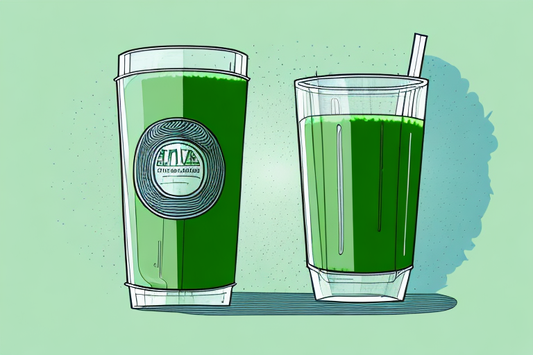
Finding Relief from Peripheral Neuropathy in the Feet & Legs Through Supplements, Diet, and Exercise
Peripheral neuropathy refers to the damage done to the peripheral nerves, causing weakness, numbness, and pain in the hands, feet, and legs. There are many potential causes of peripheral neuropathy, from infections to injuries, but it can also result from chronic conditions like type 2 diabetes. Managing peripheral neuropathy requires a comprehensive approach that combines supplements, diet, exercise, and other lifestyle changes. In this article, we'll explore how to find relief from peripheral neuropathy in the feet and legs through supplements, diet, and exercise.
Understanding Peripheral Neuropathy
What is Peripheral Neuropathy?
Peripheral neuropathy is a condition that affects the peripheral nerves, which are the nerves that transmit signals from the brain and spinal cord to the rest of the body. When these nerves are damaged, it can result in pain, numbness, and weakness in the affected areas like the feet and legs. The damage can affect one nerve or many nerves and can interrupt the messages being sent between the nerves and the brain.
Peripheral neuropathy can be a progressive condition, meaning that it can get worse over time. It is important to seek medical attention if you are experiencing any symptoms of peripheral neuropathy.
Causes of Peripheral Neuropathy
Peripheral neuropathy can stem from multiple causes, ranging from infections to injuries to underlying conditions. Diabetes is one of the most common causes of peripheral neuropathy, leading to nerve damage due to high levels of glucose in the blood. Other possible causes include alcoholism, exposure to toxins, kidney disease, and vitamin deficiencies.
Infections such as shingles, HIV, and Lyme disease can also cause peripheral neuropathy. Injuries such as broken bones, sports injuries, and car accidents can also damage the nerves and lead to peripheral neuropathy. Additionally, certain medications, such as chemotherapy drugs, can cause peripheral neuropathy as a side effect.
Symptoms and Diagnosis
The most common symptoms of peripheral neuropathy include tingling, numbness, burning, and sharp pain in the feet and legs. Some individuals also experience muscle weakness and difficulty with coordination. These symptoms can make it difficult to perform daily activities and can significantly impact a person's quality of life.
Diagnosing peripheral neuropathy involves a thorough physical examination, which may include testing for reflexes, muscle strength, and sensitivity to touch. Blood tests can also be used to check for underlying conditions that may be causing the neuropathy. In some cases, nerve conduction studies may be done to measure the speed and strength of the nerve signals.
It is important to seek medical attention if you are experiencing any symptoms of peripheral neuropathy. Early diagnosis and treatment can help prevent further damage to the nerves and improve the overall quality of life for those affected by this condition.
The Role of Supplements in Managing Peripheral Neuropathy
Vitamin B Complex
Vitamin B complex is essential for the nervous system, contributing to the healthy development and functioning of the nerves. It includes vitamins B1, B2, B3, B6, B9, and B12. Vitamin B1 is vital for the metabolism of glucose, while vitamin B12 can help repair and support nerve tissue. In a scientific trial, the use of vitamin B12 can improve nerve function in people with diabetic neuropathy.
Alpha-Lipoic Acid
Alpha-lipoic acid is a potent antioxidant that works by neutralizing free radicals that damage the nerves. It has been shown in numerous scientific studies that alpha-lipoic acid can reduce pain, numbness, and burning sensations in neuropathy patients. Additionally, alpha-lipoic acid can improve blood glucose levels in individuals with diabetes.
Magnesium
Magnesium is a mineral that is involved in various bodily functions, including nerve function. It has been shown to have a neuroprotective effect, preserving the nerve tissue and reducing the symptoms of neuropathy. Some scientific studies have linked magnesium deficiency with peripheral neuropathy, making it all the more important to ensure adequate intake.
Omega-3 Fatty Acids
The omega-3 fatty acids found in fish oil have potent anti-inflammatory properties, which can help reduce the inflammation that contributes to neuropathy. Omega-3 fatty acids can also enhance nerve function and improve blood flow to the nerves.
Curcumin
Curcumin, the active component in turmeric, has anti-inflammatory and antioxidant properties that can benefit neuropathy patients. Curcumin reduces the inflammation and oxidative stress in the nerves, leading to improved nerve function and less pain.
Consult Your Doctor Before Starting Supplements
Before starting any supplement regimen, it's crucial to consult a doctor, especially if you're taking any prescription medications. Some supplements can interact with medications, causing adverse effects. Additionally, it's important to ensure that your supplements come from a reliable source and contain the correct dosages of active ingredients.
Dietary Changes for Peripheral Neuropathy Relief
Peripheral neuropathy is a condition that affects the nerves outside the brain and spinal cord. It can cause numbness, tingling, and pain in the hands and feet. While there is no cure for peripheral neuropathy, dietary changes can help manage its symptoms.
Foods to Include
A healthy diet is essential for managing peripheral neuropathy symptoms effectively. Incorporating antioxidant-rich foods like fruits and vegetables, lean protein sources like fish and chicken, and whole grains can provide the necessary nutrients to support nerve function. Foods high in vitamins B12, B6, and magnesium like green leafy vegetables, whole grains, and beans are particularly important.
For example, spinach is a great source of magnesium and vitamin B6. It can be added to salads, smoothies or eaten as a side dish. Salmon is a great source of omega-3 fatty acids which can help reduce inflammation. It can be baked, grilled, or broiled and served with a side of roasted vegetables.
Foods to Avoid
There are also some foods that you should avoid to reduce inflammation and improve nerve function. Processed foods, sugary snacks, and drinks, alcohol, and foods high in saturated fat can contribute to inflammation and worsen neuropathy symptoms.
For example, instead of reaching for a bag of chips, try snacking on a handful of almonds or fresh fruit. Instead of sugary drinks, try drinking water with a slice of lemon or lime for flavor. Limiting alcohol intake can also help manage peripheral neuropathy symptoms.
Maintaining a Balanced Diet and Hydration
Maintaining a balanced diet is important for maintaining health. Drinking plenty of water and keeping hydrated daily also help to minimize nerve pain and prevent muscle cramps. Adequate hydration helps with maintaining healthy nerve function.
In addition to drinking water, you can also try drinking herbal tea or coconut water to stay hydrated. Eating foods with high water content, such as watermelon, cucumbers, and tomatoes, can also help keep you hydrated.
Remember, making dietary changes can take time and effort, but it is worth it to manage peripheral neuropathy symptoms and improve overall health.
Exercise and Peripheral Neuropathy Management
Peripheral neuropathy is a condition that affects the nerves outside of the brain and spinal cord, causing weakness, numbness, and pain in the hands and feet. While there is no cure for peripheral neuropathy, exercise can help manage symptoms and improve overall quality of life.
Benefits of Exercise for Neuropathy
Exercise is an essential aspect of managing peripheral neuropathy. In addition to increasing blood flow to the nerves and reducing inflammation, exercise can also help manage underlying conditions like diabetes and encourage weight loss, both of which can contribute to better neuropathy outcomes. Exercise can also help improve balance and coordination, reducing the risk of falls and other injuries.
Choosing the Right Exercise
When selecting exercises to perform, it's important to choose low-impact activities that protect the nerves and joints. Consider stationary biking, swimming, or yoga, which are gentle on the feet and legs, providing a low-impact yet effective workout.
Low-Impact Exercises
Low-impact exercises like walking, biking, and swimming can help improve circulation and reduce neuropathy symptoms. These exercises are gentle on the joints and can be modified as needed to accommodate changes in nerve function. Walking is a great exercise that can be done anywhere, and it's easy to modify the intensity based on individual needs.
Stretching and Flexibility Exercises
Stretching and flexibility exercises can help reverse nerve damage and improve range of motion. Consider adding exercises like yoga or Pilates to your routine, which can help improve flexibility and muscle tone. These exercises can also help reduce stress and anxiety, improving overall mental health and well-being.
Strength Training
Strength training can help improve balance and coordination while also enhancing muscle strength. Consider adding resistance band exercises, weight lifting, or bodyweight exercises like squats and lunges to your regimen. However, it is important to consult with a trainer on the appropriate workouts to do, and to start with light weights and gradually increase as strength improves.
Tips for Exercising Safely with Peripheral Neuropathy
To ensure that exercising is done safely, it's important to work with a doctor and physical therapist. They can help create a customized exercise plan that takes into account individual needs and limitations. Go slowly and increase the intensity gradually to prevent overexertion, causing nerve damage. Avoiding activities that are painful and always stop exercise if there is any pain and discomfort or as advised by a specialist. It's also important to wear appropriate footwear and clothing, and to stay hydrated during and after exercise.
Overall, exercise is an important part of managing peripheral neuropathy and improving overall health and well-being. By choosing the right exercises and working with healthcare professionals, individuals with neuropathy can safely and effectively manage their symptoms and improve their quality of life.
Additional Lifestyle Changes for Neuropathy Relief
Neuropathy can be a challenging condition to manage, but there are several lifestyle changes that can help alleviate symptoms and improve overall quality of life. In addition to the tips listed above, consider incorporating the following practices into your daily routine:
Healthy Diet
Eating a well-balanced diet can help reduce inflammation and promote nerve health. Try incorporating foods rich in vitamins B, C, and E, such as leafy greens, nuts, and citrus fruits. Additionally, consider adding omega-3 fatty acids to your diet by consuming fatty fish or taking supplements.
Regular Exercise
Exercise can improve circulation and reduce inflammation, making it an excellent addition to neuropathy management. Consider low-impact exercises such as walking, swimming, or yoga, and aim for at least 30 minutes of activity each day.
Staying Hydrated
Dehydration can exacerbate neuropathy symptoms, so it is essential to stay hydrated throughout the day. Aim for at least eight glasses of water per day, and consider incorporating hydrating foods such as watermelon and cucumbers into your diet.
Maintaining a Healthy Weight
Excess weight can put strain on the nerves and exacerbate neuropathy symptoms. Maintaining a healthy weight through a balanced diet and regular exercise can help alleviate symptoms and improve overall health.
Reducing Alcohol Consumption
Alcohol can worsen neuropathy symptoms and cause nerve damage, so it is essential to limit consumption. Consider reducing or eliminating alcohol from your diet to improve symptoms and promote nerve health.
Quit Smoking
Smoking can damage nerves and exacerbate neuropathy symptoms. Quitting smoking can improve symptoms and prevent further damage to the nerves.
Regular Check-Ups
Regular check-ups with a healthcare provider can help monitor neuropathy symptoms and ensure that treatment plans are effective. Consider scheduling regular appointments with a neurologist or primary care physician to manage symptoms and prevent further nerve damage.
Conclusion
Neuropathy can be a challenging condition to manage, but incorporating these lifestyle changes can help alleviate symptoms and improve overall quality of life. By prioritizing self-care and seeking medical support, individuals with neuropathy can create a comprehensive management plan that promotes nerve health and reduces symptoms.
Conclusion: Living Well with Peripheral Neuropathy
Developing a Personalized Management Plan
Living with peripheral neuropathy can be challenging, but a comprehensive approach that blends supplements, diet, exercise, and other lifestyle changes can offer relief. It's important to work with healthcare professionals to develop a personalized neuropathy management plan, where diet, exercise, and alternative therapies are properly integrated. With commitment and dedication, living well with peripheral neuropathy is attainable.
Monitoring Your Progress
Monitoring progress is critical when managing neuropathy. It is important to track the effectiveness of the chosen management plan to assess what is working and what isn't. Recognizing the progress made can instill confidence and provide positive motivation towards continued success.
Seeking Support and Resources
Dealing with the effects of neuropathy may cause emotional and mental distress. Seeking support from a counselor or peer groups can help to alleviate these emotions. There are various resources available like support groups, educational forums, and online communities where individuals can share their experiences and advice.




